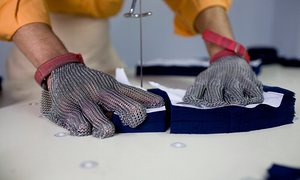
 The report estimates that employees are now being collectively denied about £1million in wages every week (Image maybe not of worker in UK) Photograph: ETI
The report estimates that employees are now being collectively denied about £1million in wages every week (Image maybe not of worker in UK) Photograph: ETI
While Leicester’s huge red brick spinning mills could have fallen quiet, they've been changed by the noise of thousands sewing devices whirring across a system of little garment production facilities and workshops that criss-cross the town.
However, “Made in Britain”, is almost certainly not everything might anticipate, with a damning new report of endemic exploitation within the East Midlands garment industry.
Relating to researchers at the University of Leicester, there have been 11, 700 employees within the sector this year. With this staff 75-90% had been being compensated £3 each hour. It is not even half of appropriate minimum wage of £6.50 and far below the UK living wage of £7.85 per hour.
The report estimates that employees are being collectively rejected roughly £1m in wages each week, and obligated to complement their particular wages with benefit benefits. In addition to that it details extensive office practices including: insufficient health and safety standards, intimidation, threats, arbitrary embarrassment, denial of toilet breaks, theft of pregnancy pay therefore the absence of employment agreements.
Talking on problem of anonymity, one fashion designer defines doing work in a Leicester design studio, which had a factory attached in which styles for UK high street stores were produced within weeks. “Through talking-to the employees we discovered that numerous of those had been compensated not as much as £3 per hour, ” she stated. “This factory ended up being one of the much better people, however it had no contracts, paid significantly less than the minimum-wage, safety and health breaches had been extensive and also the staff had minimal understanding of whatever they were eligible for as staff members.”
Related: garments while the thoughts they hold: share your photographs and tales
The designer quit this lady work when her company contracted a purchase out to “a makeshift factory at the back of a home … whenever I state a “factory”, it absolutely was simply a built-up shed, ” she said. “The tradition of shopping for may be the ‘race into the bottom’ – exactly how low priced am I able to perhaps get this?”
Hidden workers
In line with the report, the workers tend to be predominantly women and mostly from Indian, Pakistani and Bangladeshi migrant communities or from east Europe.
“On report they could walk away, ” says Dr Nik Hammer, lead researcher for University of Leicester report, commissioned because of the Ethical Trading Initiative (ETI). “But what we discovered was that it was the language skills most of the time that prevents all of them from taking tasks various other areas.”
There was also a necessity to stabilize necessary paid assist taking care of kiddies or members of the family, claims Hammer. Leicester’s son or daughter poverty price appears at 37%. So whilst garment factory tasks tend to be draining, badly compensated and favorable to ill-health, also sought-after, explains the report.









